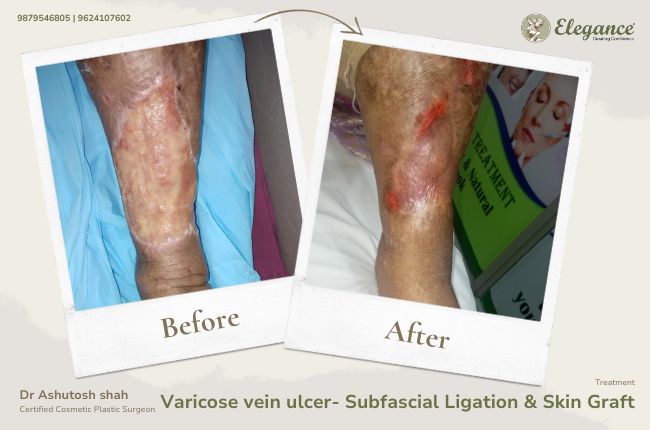Subfascial ligation is a surgical procedure used to treat varicose veins, which are enlarged, twisted, and often painful veins that can occur in the legs. The condition can be caused by a variety of factors such as genetics, pregnancy, and prolonged standing.
During the procedure, the surgeon makes small incisions in the skin, and then uses specialized instruments to locate and tie off the varicose veins. This stops the blood from flowing through the varicose vein and redirects it to healthy veins. The procedure is typically performed under general anesthesia, and it may take several hours to complete.
Subfascial ligation is considered a safe and effective treatment for varicose veins, and it can be used alone or in combination with other treatments such as compression stockings or endovenous thermal ablation.
It’s important to note that subfascial ligation may have potential risks such as bleeding, infection, and allergic reactions. It is important to consult with a qualified healthcare professional to determine the best treatment option for your individual needs and goals. Recovery time can vary depending on the extent of the surgery, but patients can expect to wear compression stockings for a period of time after the procedure to help prevent the formation of new varicose veins or recurrence.
It is recommended that the patient will be evaluated for underlying venous reflux disease before the procedure, and that a follow up appointment will be scheduled after the procedure to evaluate the results.
If you have any questions regarding our services, please contact us or call at +91 9879546805.
Hear from our patients
ExcellentBased on 1399 reviews
 Rakesh Patel2024-02-15Thanks dr. Ashutosh shah All staff
Rakesh Patel2024-02-15Thanks dr. Ashutosh shah All staff Henee Morthana2024-02-03Maru ekshidant thayu hatu Dr ashutosh shah e kari apyu ane mast thai gayu 6e to hu dr. Ashutosh shah ne thanks keu 6u Ane emna staff ne pan thans kau 6u
Henee Morthana2024-02-03Maru ekshidant thayu hatu Dr ashutosh shah e kari apyu ane mast thai gayu 6e to hu dr. Ashutosh shah ne thanks keu 6u Ane emna staff ne pan thans kau 6u Akash Bharwad2024-01-25Thanks dr Ashutosh shah
Akash Bharwad2024-01-25Thanks dr Ashutosh shah Qaid Johar2024-01-23Nice clinic
Qaid Johar2024-01-23Nice clinic Nita Trivedi2024-01-22Good staff & nice dictor
Nita Trivedi2024-01-22Good staff & nice dictor Yash Patel2024-01-16Nice clinic. Very good enivronment and specially Dr. Ashutosh shah is great.
Yash Patel2024-01-16Nice clinic. Very good enivronment and specially Dr. Ashutosh shah is great. Pratik Mahant2024-01-15Very professional service and completely satisfied with the treatment and regular checkups. Thank you.
Pratik Mahant2024-01-15Very professional service and completely satisfied with the treatment and regular checkups. Thank you. chakabhai dj2024-01-13Good staff and good service👍
chakabhai dj2024-01-13Good staff and good service👍 Kishan Mistry2024-01-11Veri good treatment for doctor
Kishan Mistry2024-01-11Veri good treatment for doctor Karan Gupta2024-01-09orchiectomy at Elegance Clinic on December 16th, experience was really very good, staff behaviour also good, also budget frendy.
Karan Gupta2024-01-09orchiectomy at Elegance Clinic on December 16th, experience was really very good, staff behaviour also good, also budget frendy.
Frequently Asked Questions
Having doubts and questions? These are few questions our customers normally ask us!
What is the purpose of hymenoplasty surgery?
Hymenoplasty is performed to reconstruct the hymen, which may be desired for cultural, religious, or personal reasons.
Can the hymen grow again?
The hymen does not regrow naturally; however, hymenoplasty surgically restores its presence.
Why is my hymen not opening?
Variations in hymen elasticity and opening are normal. If there are concerns, it’s best to consult a gynecologist.
Can a girl bleed after hymenoplasty?
Some bleeding is possible after hymenoplasty, similar to what might occur with the initial breaking of the hymen.
Can hymen bleed 2 times?
The hymen can only bleed once naturally. Post-hymenoplasty, it may bleed again upon rupture.
Does hymenoplasty restore virginity?
Hymenoplasty reconstructs the hymen physically but does not ‘restore’ virginity in a biological sense.
How many times can hymen bleed?
The hymen typically bleeds once upon tearing. After hymenoplasty, it may bleed again if ruptured.
Can a non-virgin bleed again?
Post-hymenoplasty, a woman may experience bleeding upon the hymen’s rupture, similar to the first time.
Is it necessary to bleed on the first night?
Bleeding is not a universal indicator of virginity or sexual experience. It varies among individuals.
How can a husband know that his wife is not a virgin?
Virginity cannot be determined physically. It’s a personal aspect that relies on trust and communication.
How long does hymen take to heal?
The healing time for hymenoplasty is typically around 6-8 weeks, but it can vary.
Do boys bleed on the first night?
Boys do not experience bleeding related to virginity.
Did your wife bleed on the first night?
This is a personal and private matter, and bleeding is not a definitive indicator of virginity.
Can you bleed if your partner is too big?
Bleeding can occur due to various reasons, including the size of the partner, but it’s not a certainty.
Contact Us
Ready to discuss? Fill out our contact form for a confidential consultation.








